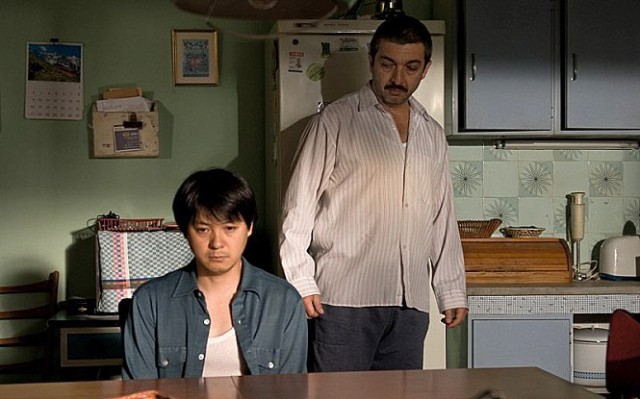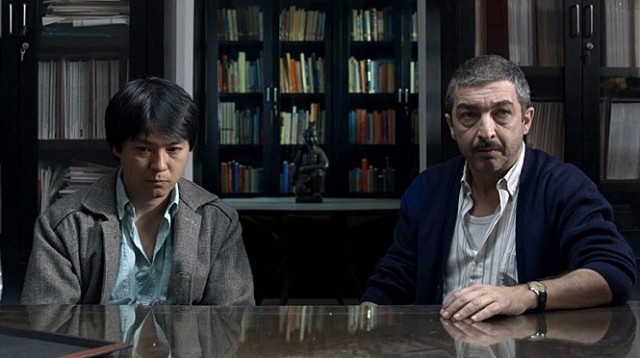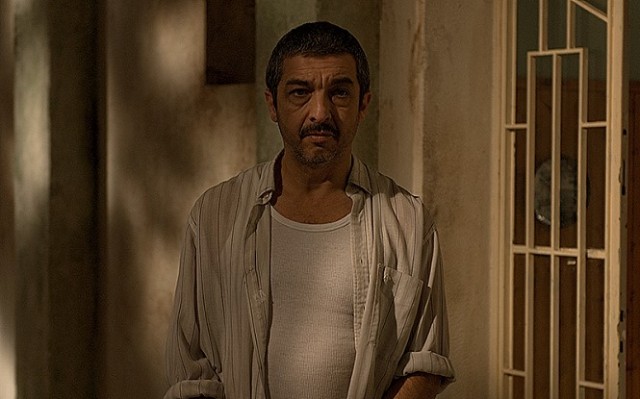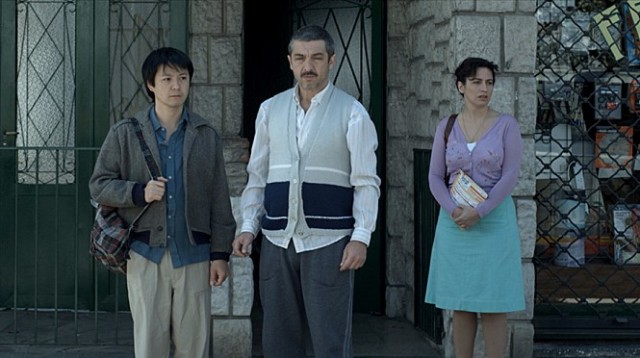
The opening scene of Argentine film “Chinese Take-Away” looks so absurd that you will not believe that, as shown during the end credits, this darkly comic moment is actually inspired by a truly bizarre real-life incident. Yes, such incidents like that can just happen by sheer coincidence, and we cannot help but amused and horrified as being reminded of how random and unpredictable our world can be.
While his private hobby is collecting newspaper articles about those unbelievable incidents, the daily life of Roberto (Ricardo Darín) has always been stable and ordered in contrast. Running his small hardware shop, he is quite fastidious about many things including the exact number of screws in one ordered package, and he is not so pleased when the number turns out to be incorrect. Living alone in his small residence right next to his hardware shop, he follows the daily routine to which he has adhered for nearly 30 years, and his day always ends at PM 11:00 as he turns off the lamp besides his bed.
There are a very few people around Roberto. Leonel (Iván Romanelli), who is probably the only guy who can be regarded as Roberto’s friend, routinely visits him, but that is mainly for delivering newspaper articles to be pasted on Roberto’s old scrapbook. In the case of Mari (Muriel Santa Ana), this lovely lady has apparently carried a torch for Roberto for years, but he is reluctant although his heart still yearns for her as before.
While his life seems to be destined to keep going on like this, Roberto comes across an unexpected incident during one afternoon. When he is comfortably resting by the road, he witnesses a young Chinese guy being suddenly kicked out of a taxi. It is pretty clear that this flummoxed lad really needs help, so Roberto provides a temporary staying place to him, and Jun (Ignacio Huang) is grateful for his generosity although he cannot speak Spanish at all.

Thanks to the Chinese Embassy and other Chinese people in the city, Roberto comes to learn more about Jun’s current trouble. Because there is not any close family member in his homeland, Jun decided to go to Argentina where his only uncle lives, but his uncle turns out to be more difficult to find than expected. The Chinese Embassy can surely help locating his uncle, but it will take some time, and that means Jun will have to stay together with Roberto for a while.
Of course, Roberto does not welcome this change. Mainly due to their language barrier, Jun often disrupts Roberto’s orderly daily life, and that annoys and frustrates Roberto a lot, but he lets Jun stay at his home anyway as their initially strained relationship is slowly developed day by day. They manage to communicate with each other through gestures to some degrees, and Jun does some jobs for Roberto while also warmly welcomed by Mari, who gladly invites Jun to a dinner and shows him around the city.
It goes without saying that this is a story of familiar type, but the movie takes its time as building up its plot through small moments of humor and humanity. While Jun is indeed a typical stranger who brings changes into our grumpy hero’s mundane life, he comes to us as a human character less stereotypic than expected. Through his awkward interactions with Jun, Roberto gradually reveals a kind, decent man behind his gruff attitude, and there is an unexpected moment when he realizes something common between Jun and himself.

The movie is also quirky and humorous as maintaining its low-key approach, and the director/writer Sebastián Borensztein has a fun with a number of outrageous scenes which depict some of the incidents described in Roberto’s collected newspaper articles. In the case of a certain scene with one mean police officer, it gives a nice example showing the importance of surprise as a crucial element of comedy, and I was also amused by how the movie cleverly utilizes this for more chuckles later.
The main cast members all give well-rounded performances to hold our interest. Ricardo Darín, whom I came to notice for the first time via his memorable lead performance in Oscar-winning film “The Secret in Their Eyes” (2009), is likable even when his character is on his grumpiest mode, and he and his co-star Ignacio Huang have nice understated comic chemistry during their scenes. While Jun usually speaks Chinese without subtitle, Huang’s unadorned performance makes you emphasize with his character’s confusion and desperation even if you do not know Chinese, and I must mention that the movie is one of a few recent cases which point out the difference between Mandarin and Cantonese. As two other substantial characters in the film, Muriel Santa Ana and Iván Romanelli provide amiable supporting performances, and Ana is sunny and sexy as a forthright woman who has patiently waited for her man to come closer to her.
“Chinese Take-Away” is modest but charming as a funny, heartfelt story about how two total strangers can be nice and kind to each other in spite of their many differences. Wisely avoiding sappy sentimentalism and deftly going around humor and pathos, it richly earns its feel-good ending, and Darín’s wordless face during that moment is more than enough for telling us how much his character becomes different than before. I recently enjoyed his another terrific performance in Oscar-nominated film “Wild Tales” (2014), and now I am looking forward to chances of watching more of this engaging Argentine actor.







